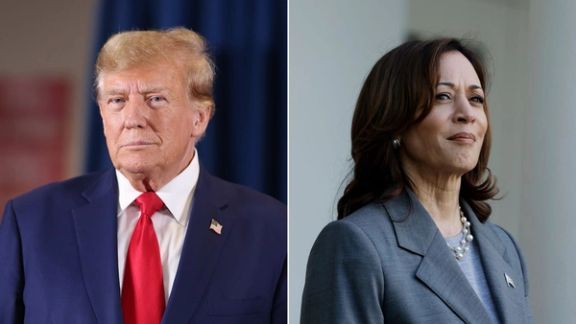Iran state media weighs US election impact on stalled economy

As Americans head to the polls to elect a new president, voices on Iranian state media largely dismissed the impact of the result on an economy battered by US-led sanctions.

As Americans head to the polls to elect a new president, voices on Iranian state media largely dismissed the impact of the result on an economy battered by US-led sanctions.
From economists to lawmakers, commentators asserted that Iran's economy has become resilient to external pressure and whether Donald Trump or Kamala Harris is elected will make little difference.
Iran’s economy remains under severe strain due to decades of mismanagement and international pressure. The economic landscape is marred by high inflation, low growth, and strained relations with the West with no end in sight.
Seyed Yousef Hosseini, former head of the Currency Committee at the Iran Chamber of Commerce, urged domestic media to focus on budget analysis rather than what he sees as sensationalism around the US polls.
“While the US election might have a limited, short-term psychological effect on Iran’s economy at the beginning of the new US administration, its overall impact is minimal,” he told ISNA.
“Some even suggest that if Trump wins, Iran’s economy will suffer major negative consequences. If Trump had the power to effect substantial change, he would have done so during his previous term when he was at the peak of his influence,” he said in a separate appearance on Mehr News, which operates under the state’s Ministry of Culture and Islamic Guidance.
Economist Mohammadreza Ranjbar Fallah also said there is little difference in Democratic and Republican policies toward Iran.
In an interview with the state-controlled Tasnim agency, Fallah said the US election results will not significantly alter the sanctions landscape, suggesting that all possible sanctions have already been applied and that little new damage is likely.
President Barack Obama and President Joe Biden's democratic administrations prioritized a deal over Iran's disputed nuclear program, which under the former provided sanctions relief. Republicans under Donald Trump favored a maximum pressure approach which deepened Iran’s economic pain.
"Not much value"
In contrast, Fada-Hossein Maleki, a member of the Iranian Parliament's National Security Commission, told a domestic outlet that it does matter whether Trump or Harris becomes the next US president.
“One clear fact remains: the Americans did not fulfill their JCPOA commitments," the senior Iranian lawmaker added, referring to the nuclear deal. "For Trump to bring us back to the negotiating table, he would need to pay a heavy price.”
Agreeing with that viewpoint, economist and University of Tehran professor Albert Baghzian suggested that although US election outcomes may affect sanctions and diplomatic tensions, Tehran should not rely on external shifts for economic relief.
"If Republicans regain power, they will likely continue strict policies toward Iran, including increased sanctions … Democrats may follow similar policies but tend to pursue less aggressive means," Baghzian said.
Foreign Minister Abbas Araghchi joined the chorus attempting to downplay the relevance of the election, saying on Tuesday that Tehran’s foreign policy will remain unchanged.
"We do not place much value on the US presidential election or on who is elected, and it has no impact on Iran's fundamental and strategic positions," Araghchi said.
Hamid Hosseini, a domestic expert on the country’s oil and gas industry and a member of the Iran-Iraq Chamber of Commerce, told ISNA that Iran’s alliance with China acts as a buffer against Western pressures, particularly in the oil sector.
“With Iran’s strategic relations with China, there’s no need to worry that the US election will disrupt our oil exports,” Hosseini said.
Outside of Iran, Reza Pahlavi, the son of Iran’s former monarch, told podcaster Patrick Bet-David recently that the economic pressure exerted on Tehran by former President Donald Trump almost made the Islamic Republic fall.
Pahlavi argued that with the Republican sanctions regime, the momentum was “in the right direction” to help Iranians overthrow the clerical state.
Republicans, including Senator Ted Cruz, have highlighted that Iran's oil exports are now at their highest levels since 2018, blaming the Biden administration for strengthening Iran rather than weakening it.
Democrats, on the other hand, argue that they have imposed one of the toughest sanctions regimes on Tehran to curb its influence in the region.